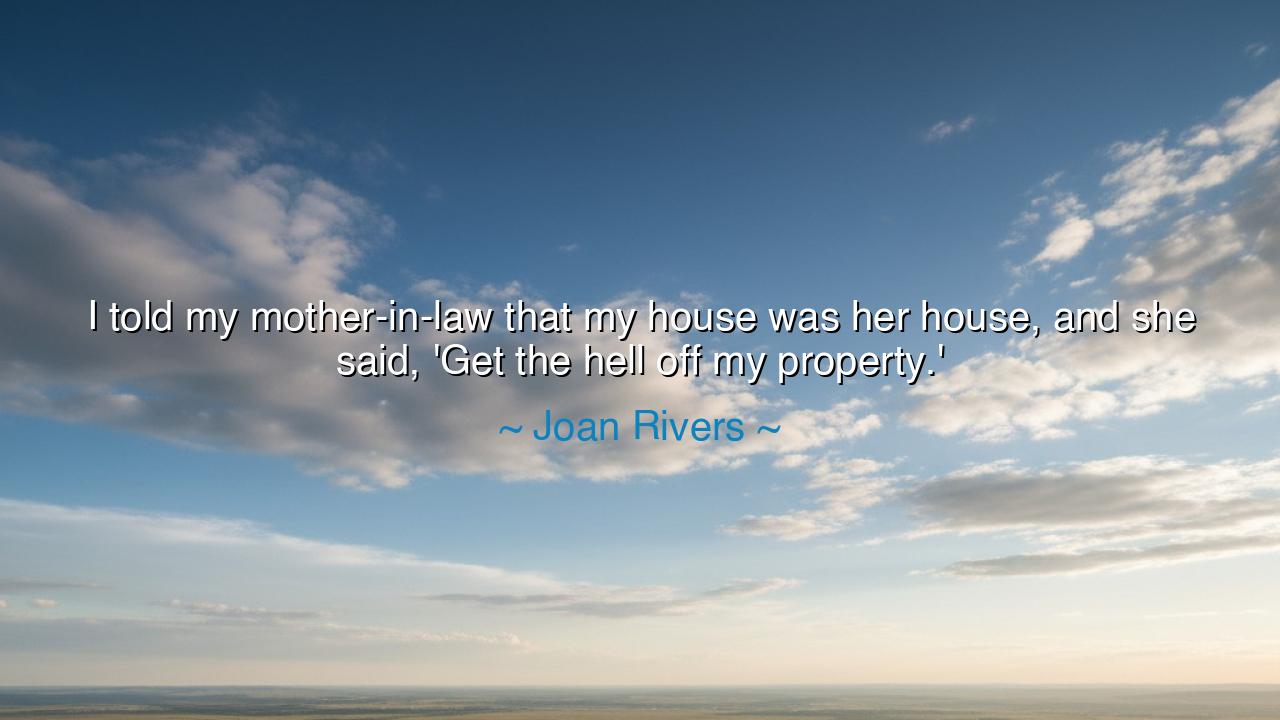
I told my mother-in-law that my house was her house, and she
I told my mother-in-law that my house was her house, and she said, 'Get the hell off my property.'






"I told my mother-in-law that my house was her house, and she said, ‘Get the hell off my property.’" — thus quipped Joan Rivers, the sharp-tongued comedienne whose wit cut through the solemnities of life like a blade gilded in laughter. Beneath the sparkle of her humor lies an enduring truth about human nature: that even in jest, we reveal the tender chaos of family, the pride of ownership, and the eternal dance between affection and independence. In this jest, there hides wisdom — for every home, every heart, and every generation must learn to share space without surrendering self.
The meaning of this quote is deeper than its laughter suggests. Joan Rivers, the queen of irony, used humor to expose the contradictions of human relationships. When she tells of offering her house to her mother-in-law as if it were her own, only to be met with fiery rejection, she paints a picture both absurd and familiar. It is a jest about boundaries — that delicate balance between generosity and control, between welcome and possession. The joke makes us laugh because it is rooted in truth: love may unite families, but pride often divides them. What we call “my house” or “your house” becomes a symbol of our need for identity, for recognition, for the sovereignty of the self.
The origin of this humor lies in the life and art of Joan Rivers herself — a woman who carved her throne in a world dominated by men, using laughter as both armor and sword. She knew the weight of human tension, the fragile truce that exists between family members, and the absurdity of the roles we play. Her humor was never aimless; it was the laughter of survival. Having faced rejection, loss, and scrutiny, Rivers turned pain into performance. In her world, the mother-in-law — that archetype of familial challenge — became not merely a source of annoyance, but a mirror reflecting the stubbornness of love itself. Through laughter, she reminded us that life’s absurdities are best met not with bitterness, but with wit.
There is, in this jest, a lesson as old as civilization: that generosity without humility can wound, and pride without warmth can isolate. Many have lived this truth, from kings who offered kingdoms only to see them claimed by others, to families torn between affection and authority. Consider the tale of King Lear, who sought to divide his realm among his daughters as an act of love — and in doing so, lost both his kingdom and his peace. Like Rivers’ tale, though writ in tragedy rather than comedy, it warns us that even acts of kindness must be tempered with understanding, and that words of offering can carry hidden storms when pride and misunderstanding dwell nearby.
But where Lear’s story ends in ruin, Joan Rivers’ humor rescues the same truth with laughter. She teaches us to look at life’s frictions not as curses, but as proof of our closeness. Family conflict — that eternal theatre of love and irritation — is not a flaw, but a sign that we care deeply, even when we cannot agree. Her joke shows that we all guard our “property,” be it physical, emotional, or spiritual, yet we all long to be welcomed into another’s home. The paradox of love is this: we wish to belong without losing ourselves, and to share without surrendering.
Thus, the wisdom in her jest is this: learn to laugh at the boundaries that divide you. Do not take offense where there is humanity, nor pride where there could be peace. The mother-in-law’s fiery retort — “Get the hell off my property” — is, in truth, the cry of every heart that fears intrusion, even from love. To live well is to know when to give space, and when to invite warmth. To love well is to let others belong without erasing the sanctity of their own spirit.
So, take this lesson, O listener: meet the absurdities of life with laughter, not resentment. When words clash, when pride rises, remember that behind every sharp reply beats a human heart longing to be understood. Offer your home, your time, your heart — but do so with humility. Respect the invisible walls that others build, and be wise enough to know when to knock and when to step back. For as Joan Rivers knew better than most, humor is not the absence of struggle — it is the light that keeps love alive amid its storms.
And so, let us laugh as we live — for in laughter there is forgiveness, and in forgiveness, there is peace. The home, after all, is not measured in walls or property, but in the grace to share both space and spirit — even when the door closes with a witty, human cry: “Get the hell off my property.”






AAdministratorAdministrator
Welcome, honored guests. Please leave a comment, we will respond soon